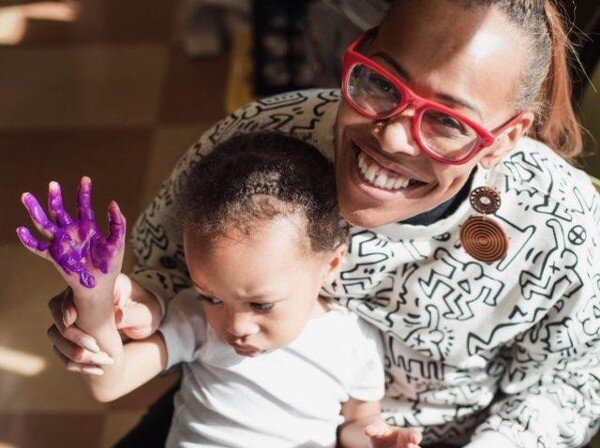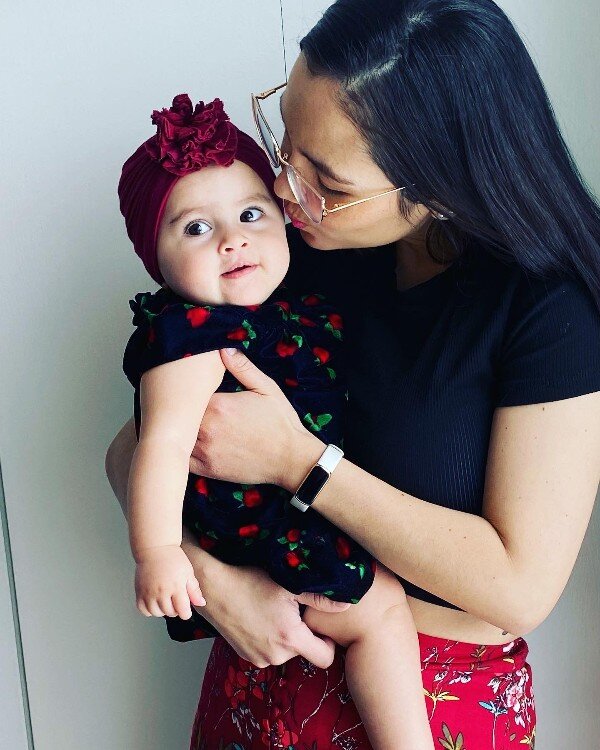'Baby Café' lactation support group creates a place of solidarity for parents

DENVER — When Danette Hollowell thought about how she navigated motherhood as a single parent at 17 years old, she remembered a group of supportive older women that became surrogate mothers to her.
It was through their conversations with each other that Hollowell’s interest in birth work, particularly for the Black and Latinx communities, began.
“It’s pretty much my dream job working with moms and babies and really being that support that I felt like maybe a person who had been in my position could not have,” Hollowell said
She learned everything she could by taking early learning classes and becoming a doula and a certified lactation consultant. She wanted to support parents raise healthy, happy babies by providing them as much information as

possible.
When Hollowell is not doing birth work, she is a food entrepreneur for Metro Caring, an organization that addresses poverty and hunger by providing nutritious groceries, classes and community gardens.
It was through a series of conversations Hollowell had with some other folks associated with Metro Caring Food Pantry — along with her experience having a baby during the pandemic — that sparked the idea for the Baby Café lactation support group. The group is hosted by Metro Caring in partnership with Metropolitan State University Denver.
They wanted to create an additional safe space where lactating parents, especially Black and Brown parents who may have experienced inequitable treatment in healthcare, could receive resources, support, and care from professional certified lactation consultants.
Hollowell, who is one of the individuals that lead the support group, has found that many parents need encouragement. She said that it’s important to acknowledge the emotional and physical toll it can be to have a newborn, never mind trying to breastfeed.
Keily Duran remembered how nervous she was attending Baby Café at first.
“You feel vulnerable at the beginning. You don’t want other people to see you struggling, to see that you probably feel that you’re not an expert, that you’re not doing well,” Duran said.
Duran shared her story of what it was like to give birth to her first child in Colombia, her home country, and said that her difficult experience greatly impacted the postpartum depression she had afterwards.
She told Rocky Mountain PBS that she was separated from her baby immediately after giving birth and was made to wait with all the other moms that had also given birth in one room.
“I didn’t see him for an hour,” Duran said.

When the nurses brought Duran’s baby back, she asked them about whether she should try breastfeeding him, but they dismissed her questions and told her that the baby would eat when he was hungry rather than providing additional information.
Duran was moved to a room with another mom for the night, and nurses instructed their relatives to leave because no one was allowed to stay the night.
“When our family left, this nurse said, ‘I don't want anyone crying over the night you guys didn't have a C-section, so there's no reason to cry. You can go to the restroom on your own. I only want you to press that red button if it's really necessary,’” Duran said.
The nurse’s words demoralized the two women in the room. When she left, they both began to cry.
In the middle of the night, Duran tried to breastfeed her baby, but her efforts were painful, and he wouldn’t latch. And because Duran had an episiotomy, she was also in pain when she needed to go to the bathroom. After trying multiple times, she called the nurses for help.
They told her to keep putting the baby on her breast or use formula. But the baby wouldn’t drink it, so Duran had to go back to trying to breastfeed.
Duran told Rocky Mountain PBS that she felt powerless and vulnerable that night.
After going home, Duran tried to look up as many videos as she could about breastfeeding to figure out why she was experiencing so much pain and discomfort when she was breastfeeding her baby. When she went to her doctor’s appointments, she simply was told everything she was experiencing was normal without further assistance.
“I had panic attacks,” Duran said. “I felt that horrible pain on your chest when you have an anxiety attack. I felt like I couldn't breathe. I didn't feel my hands. So I experienced lots of things that I know now were postpartum depression … but I didn't have any help at the moment.”
In 2018, Duran and her family moved to the United States.
It took a long time before Duran was ready to have another baby, she said. But when she was pregnant again, she had a much more supportive birth team and a psychologist that helped Duran prepare for potential postpartum depression. She also became friends with a lactation consultant at her church, who showed Duran that babies could get breast milk without being directly breastfed.
Duran realized that she had an oversupply, which made it difficult for her baby to drink the breast milk, and found that breast pumping more often helped solve the problem. Around February 2022, the same friend from church told Duran about Baby Café.
Though Duran no longer directly breastfeeds her baby anymore, she was interested in donating milk and regularly attends the support group.
She has heard the group talk about breast milk, sleep routines, what to do when a baby wakes up at night. Duran shares her journey navigating breastfeeding and pumping to find a feeding process that worked for her and her baby.
Duran told lactating parents how important it is to have a support system and to utilize the free and affordable resources nearby when they need help.
“Find the right groups like this, like Baby Café, where you’re going to be loved, where they’re going to care for you and take care of you,” she said.
Theresa Ho is the RMPBS Kids digital content producer. You can reach her at theresaho@rmpbs.org.
